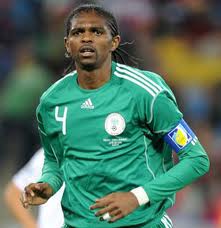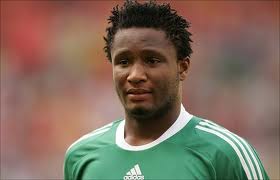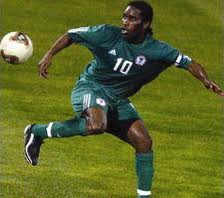[Nigeria Report] Soccer, a vehicle to unite people in Nigeria
Nigeria is a heterogeneous country with about two hundred and fifty (250) ethnic nationalities and speaks about seven hundred and twenty languages (720) although Ibo, Hausa and Yoruba are the dominant three languages that are spoken in Nigeria. Religion wise, Nigeria has an equal Christian and Muslim population.
Such complicated ethnic and religious concoction have made people in Nigeria place higher loyalty to regional or religious cause to that of the country. Groups like the Niger Delta Militants tilt to region, Boko Haram tilt to religion while Erewa, Ohaneze and Afanifere are all ethnic groups.
But irrespective of these differences, there is a religion, event, entertainment that unite Nigeria. The instrument is soccer, known more in Nigeria as ‘football’
Since the 1945 when the Nigerian Football Federation was founded, the West African nation has become a top soccer contender on the international stage. Nigeria, under British control for centuries, has played in the World Cup and Olympics, and held its own professional national championships since gaining full independence in 1960.
Early Sports
Although sports have been an integral part of Nigerian society for centuries, they were little more than leisure activities. Prior to 1963, few athletes made an international impact, especially in football. According to Online Nigeria, the National Sports Commission was founded to lay the foundation for all sporting event organization in Nigeria. Though the Nigerian Football Federation already was a governing body, football in Nigeria was still confined to the African boundaries, rarely making appearances outside the continent. Championships were played among rival clubs from Lagos, Port Harcourt and Calabar.
The Challenge Cup
Nigeria began participating in Africa’s Challenge Cup in the 1960s which was originally named the Governor’s Cup by the British colonial government. The participation in the Challenge Cup fueled Nigeria’s desire to play in the World Cup. In 1972, the Nigerian National League was born, beginning with five (5) teams and growing to twelve (12) by 1978. It has since grown to twenty (20) teams with other divisions and Federation cups.
But soccer as a professional money spinning venture is still new in Nigeria. Most people play soccer just for fun and not really for money. They usually start playing soccer without football boot in a sand beach before going into the field. Even though Nigeria is a tropical country with a vast land mass, play fields are hard to come by and this has always caused the players not to grow to their potentials. The Nigerian Premier League has since grown to a reputable level where they have twenty teams participating and the Federation cup. Enugu Rangers has the most winners medal than any other club side in Nigeria with seven (7) league titles while Dolphin of Port Harcourt are the current champion having won the cup last season for their second league title.
Enyimba Fc of Aba is the most successful club in Nigeria. They have won the league six (6) times in the last fourteen years, Two (2) CAF Champions League trophy (the only Nigeria Club side to do so), two (2) FA cups, two (2) African super cups, two (2) Nigerian Super cups and a league title from the National Division one.
Black Day
The darkest day in Nigerian Football was the day when Samuel Okparaji died on the pitch playing for Nigeria. Samuel Sochukwuma Okwaraji (May 19, 1964 – August 12, 1989) was a professional footballer who played internationally for Nigeria. He was also a qualified lawyer who had masters’ degree in international law from the University of Rome. He collapsed and died of congestive heart failure in the 77th minute of a World Cup qualification match against Angola at the Lagos National Stadium in Surulere, Lagos State on 12 August 1989.
Formation and Style of Play
Nigeria most times line up in a four-four-two (4-4-2) formation. The two strikers are supported by the two wingers, making the team to look like playing with four attackers.
Nigeria is known all over the world as a country that plays sexy style of soccer. The sleek passing of the ball from defense to attack always anchored by a notable play maker in the midfield. The play maker dictates the pace and style of play for the Nigerian team. And no Nigerian teams from junior to senior levels go to a tournament without an outstanding play maker.
The passing of the ball in long or short precise range cum dribbling ability makes Nigeria to be about the most entertaining team in most tournaments. The sheer ability of all the players to dribble and pass the ball comfortably is from the fact that most Nigeria players play soccer first with an orange fruit and on a hard surface that when they get to a pitch; it is a lot easier for them to move the ball the way they want.
Achievements
Nigeria won bronze medals in the 1976, 1978, 1992, 2002, 2004, 2006 and 2010 African Cup of Nations competition. Nigeria also won Silver medals in the 1984, 1988, 1990 and 200 African Nations Cup. In 1980 and 1994, the Super Eagles won the championship in Lagos and in Tunis. Nigeria also won soccer gold medal in the 1996 Atlanta Olympics after defeating Brazil in the semi-finals and Argentina in the Finals. In 2008 Beijing Olympics, Nigeria were defeated by Argentina to win the silver medal.
Nigeria was the beaten finalists in the under 20 youth championship held in Netherlands in 2005. The under 17 Nigerian team (the gold Eaglet) won the 1985, 1993 and 2007 FIFA world Championship in China, Japan and Korea respectively.
Famous Players
Nigeria has produced lots of talented players who have thrilled the world soccer fans with their skills. It is often said that Nigeria has an embarrassment of playing personnel. In the 1980s, the country had the likes of Christian Chukwu, Etim Essien, and Modi lawal. In the 1990s, the country had the likes of Stephen Keshi, Daniel Amaokachi, Austin Jay Jay Okocha and Kanu Nwankwo. This time, Nigeria has Mikel Obi, Osaze Odewingie, Joseph Yobo and the Uche brothers.
The skill of Jay Jay Okocha is unequalled in the history of Nigerian soccer. His guile and showmanship on the ball always made him a beauty to behold during his playing days. Kanu Nwankwo thrilled soccer fans with his rubber led skills and intelligence on the ball. He is the most decorated Nigerian player-having won almost everything that is there to win for both country and club side.
Mikel Obi of Chelsea fc of England is seen in Nigeria as the heir apparent of the traditional number ten (10) jerseys (The playmaker) and Okocha’s supplant. He is the second most decorated Nigeria soccer player at the age of twenty five (25). He is skilled in ball possession and has a telegraphic passing ability. He dazzles soccer lovers with his passing skills, marking finesse. His wizardry in ball holding made him one of the finest defensive midfielders in the world.
Nigeria did not qualify for the London 2012 soccer tournament.
The Nigerian female soccer team in the other hand has won eight (8) African female Championship out of nine (9), Making them the most successful African female team. They have played in all female world cups and have participated in three out of five Olympics. They did not qualify for this year’s Olympics in London.
Nigerian Soccer team is a uniting vehicle for the country because when Nigeria is playing soccer; all Nigerians support them and have that sense of nationhood. Like Cricket in South Africa that healed the wound of apartheid, Soccer has contributed immensely to the continual living together of Nigerian. Soccer may not be the reason Nigerians are still together, but it may be at least an influence. Soccer may be just an entertainment, some may see it as a craze, to some it is a god or religion in Nigeria, it transcends all things and is the invincible peace maker.
Uwalaka Temple U.B Intern Reporter news@theasian.asia














































































